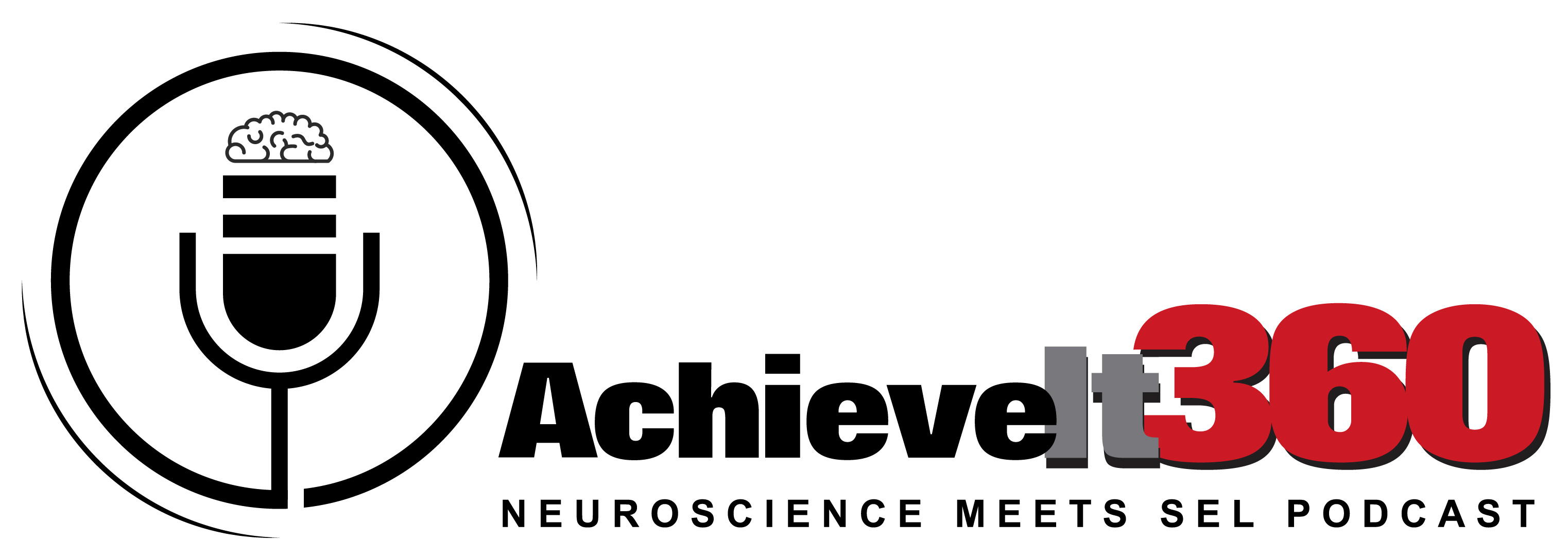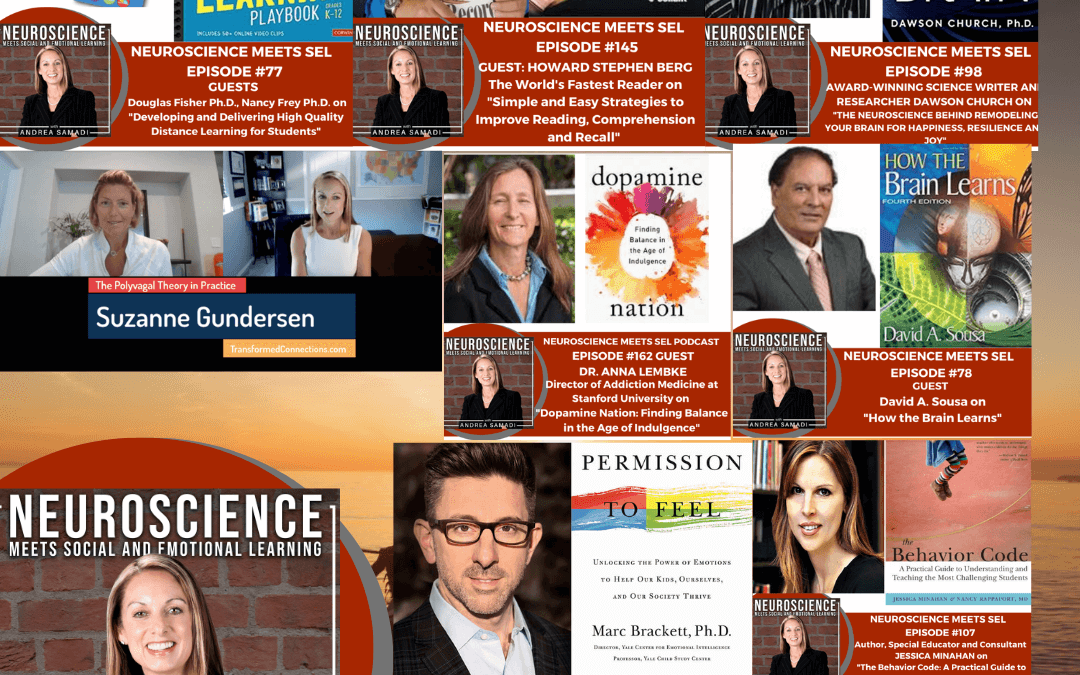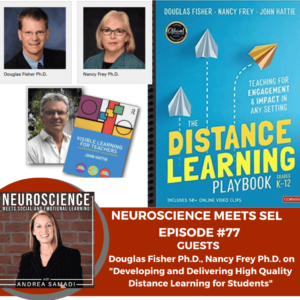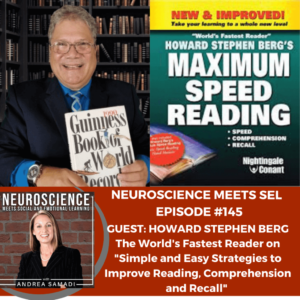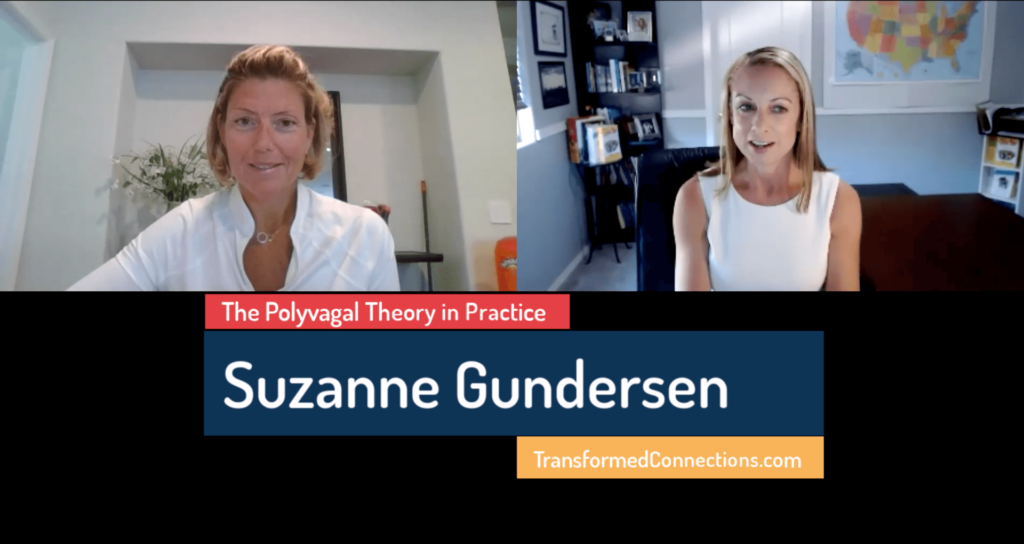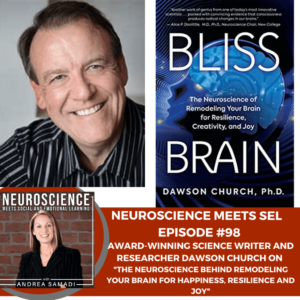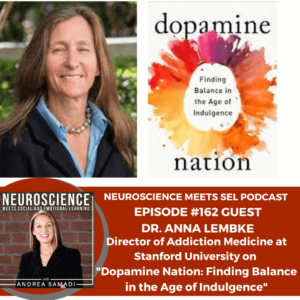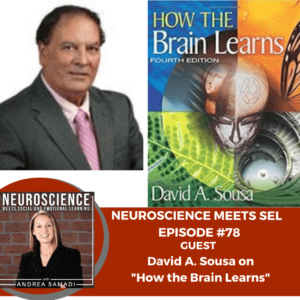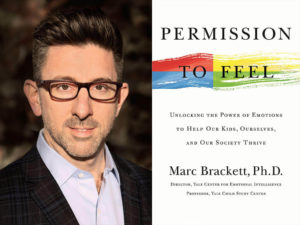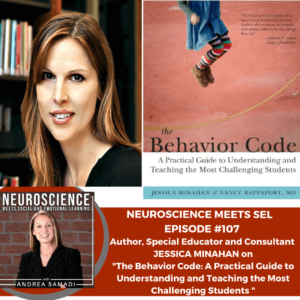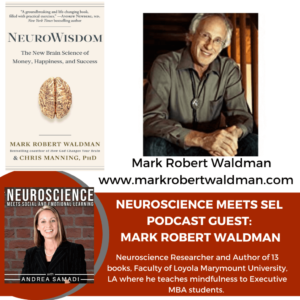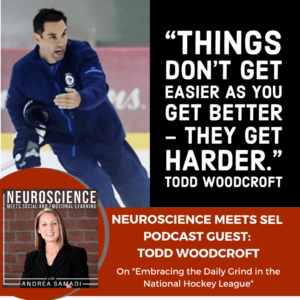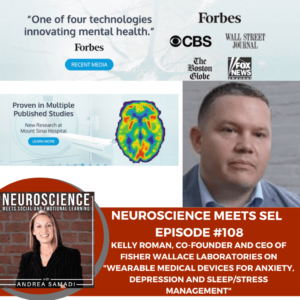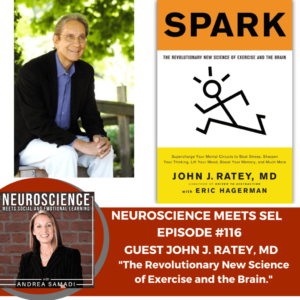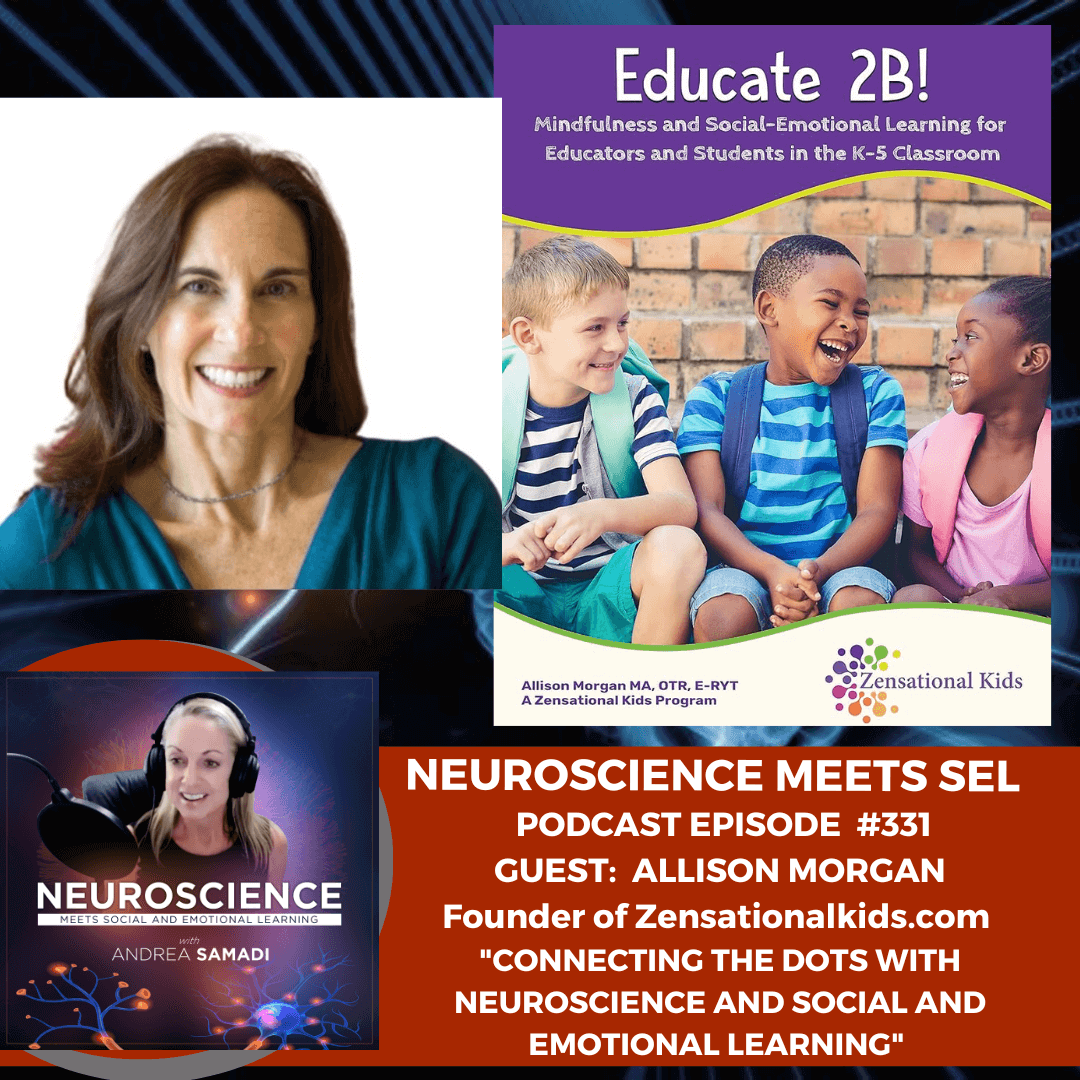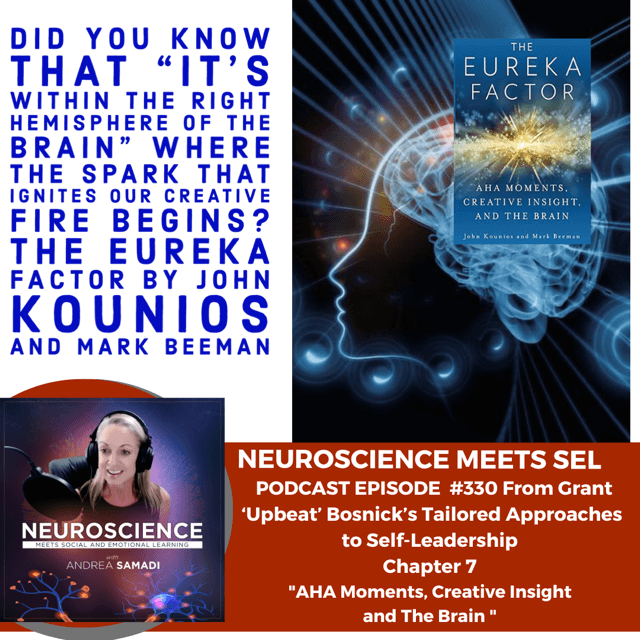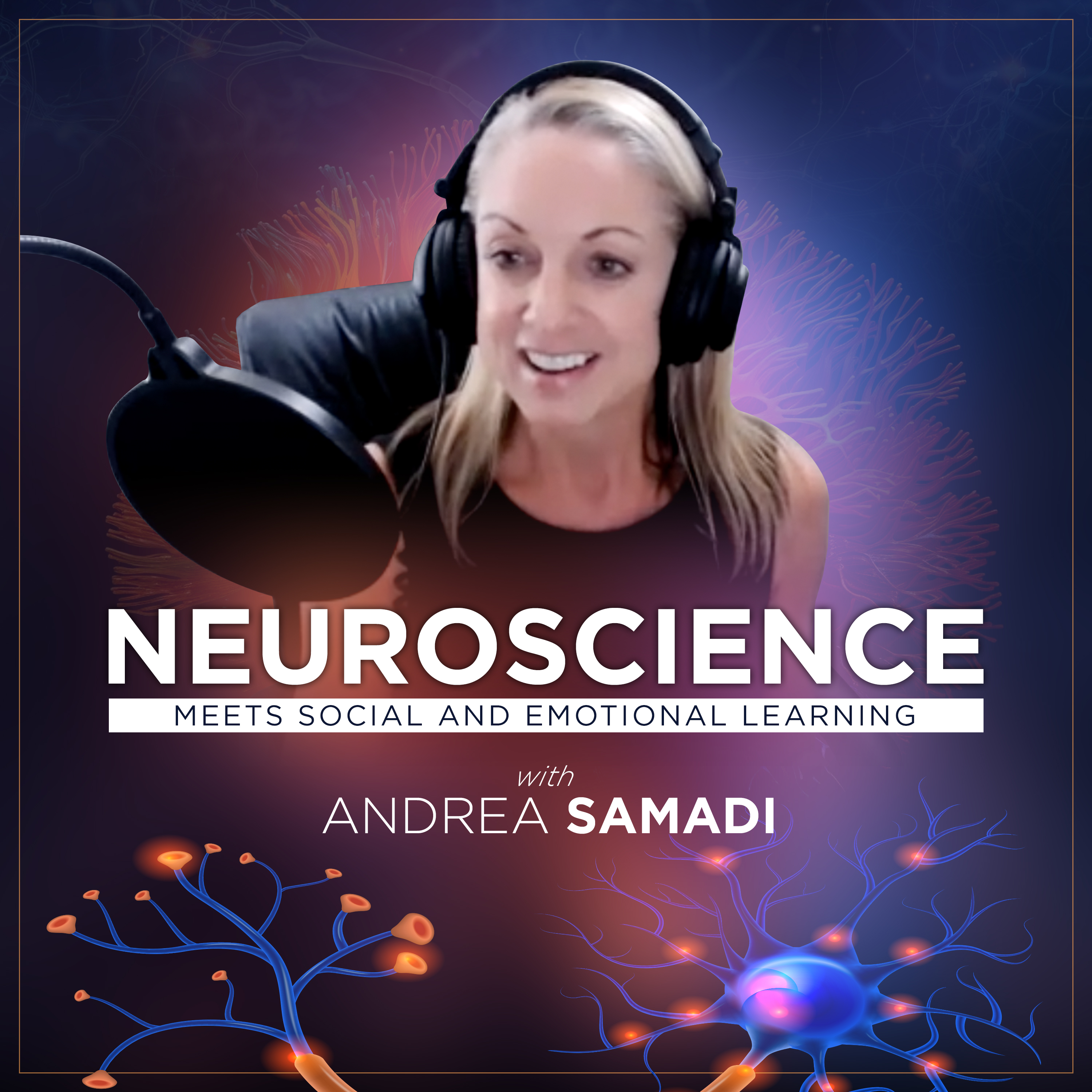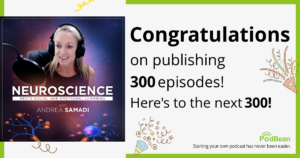Welcome back to The Neuroscience Meets Social and Emotional Learning Podcast, where we cover the science-based evidence behind social and emotional learning (for schools) and emotional intelligence training (in the workplace) with tools, ideas and strategies that we can all use for increased results.
I’m Andrea Samadi, and launched this podcast to share how important an understanding of our brain is for our everyday life and results–whether we are a teacher in the classroom, or in the modern workplace, and release content to help all of us, specifically on the topics of health, wellbeing and productivity.
This weekend, I heard a message from New York Times Best Selling author of the book, High Performance Habits, Brendon Burchard[i], that got me thinking about where we are right now in the world today. He said that while there might have been times during the Pandemic where we laid low, or held back in protective mode, the pendulum has swung the other way now, and that there is a high need for us ALL to be “more productive as a nation”[ii] as we enter this next phase of the economy, and showing up with our A-game is not just timely, but crucial.
I know that listeners of this podcast are high performing, with learning new things at the top of your list, so with this in mind, for today’s EPISODE #233, I wanted to go back and review our TOP 12 Most viewed YouTube Video Interviews, as chosen by you, the listener, so we can all go back to the basics, and review some of the most important lessons learned on this podcast, since we launched just over 3 years ago.
I used to love listening to radio icon, Casey Kasem’s American Top 40[iii] back in the 1980s on my clock radio when I was in high school, where he would leave you in suspense as he counted backwards, to the #1 song, but for this countdown, I will start with our #1 most listened to episode, with something I remember about each one, or the speaker, and a link that we can all use to revisit, and “Sharpen our Saw”[iv] as Dr. Stephen Covey would say, as we can go back and review these most listened to episodes with the 7th Habit.
Since I keep an eye on the numbers of this podcast, whether it’s with the audio interviews, or video, I thought it was interesting that the Top 10 list holds 8/10 people who were in our early interviews, or the 1st 100 interviews, with 2 people who came in later, and rose to the top. While I think ALL interviews hold important lessons, let’s begin with our Top 12.
Let the Countdown Begin…
- The #1 most watched interview, is our first interview with Douglas Fisher and Nancy Frey, EPISODE #77 on “Developing and Delivering High Quality, Distance Learning”
[v]that we can all remember came right as parents and teachers were thrown unexpectedly into the world of online learning. Watch this interview by clicking here https://youtu.be/7nLe3P50j4Q and review their tips to help all of us succeed in this every changing world. Don’t miss their return to the podcast for EPISODE #161 with their new book with John Almarode, “How Learning Works”[vi]where they tie learning and the brain What I will never forget with both these interviews is the timing of them. I’m sure no one will ever forget just how disastrous it was bringing our children to at home learning, and by the time we got to revisit everyone, for EPISODE 161, we were right in the middle of the Pandemic, and I remember in the second interview, we ALL had terrible colds. None of us cancelled this interview, that we did at 6am PST but we all said prayers for family members who were struggling with COVID, and we covered the content, using all of our energy to do so. I do receive emails about 2 two specific interviews from Education Departments in different parts of the country who ask if they can use them as models for their students on best practices for interviewing as well as for the content provided, which brings me to think about the fact that regardless of how we are feeling before we have to present something, “A Pro is at their best, regardless.” (Bob Proctor).
2. The second most watched interview was with Howard Berg, The World’s Fastest Reader, with over a 90% comprehension rate on “Simple and Easy Strategies to Improve Reading, Comprehension and Recall.” Watch this interview herehttps://youtu.be/Al0B6HzxtEk This was such a fun interview, as Howard is an incredible teacher who I had no idea was like me, a former swimming teacher who learned about the importance of the student “wanting to learn” to swim that he translated into learning years later. I had met Howard years before I asked him to do this interview, and followed his work, using one of his speed reading strategies with my youngest daughter to help her to stay focused with reading. (It’s a common strategy of putting your finger on the page while you are reading, but Howard can show you that this practice can significantly improve reading speed and comprehension with many other important tips to improve memory and learning, that I think includes using humor to engage your students.
3. The third most watch interview is with Suzanne Gundersen on “The Polyvagal Theory in Practice” that you can watch here https://youtu.be/WCFrygUG-UI Understanding the Polyvagal Theory, and how our body shifts between rest and digest, fight or flight and total shut down became important for educators in the classroom to understand the states of minds of their students, and why they were acting certain ways, with strategies that can be used to calm down a student who might be struggling. I’m not going to skip this bit of feedback that you can read in the comment section of this interview, because it’s important that when we receive constructive criticism that we hear it. This interview on stress reduction, I do hear often “why did you choose that hyper music for a stress-reducing interview?” The answer is pretty simple, I try not to be defensive, and hear the criticism, so I can take it in to learn and improve, but I honestly had no idea what music to use when I first started out. I can see now that I should have chosen a calmer selection of music for this interview. We are all learning together here.
4. The 4th most watch interview is with Dawson Church on his Bliss Brain Book and Daily Meditations. Watch the interview here https://youtu.be/bH8yVKHjFN4 While I still use Dawson Church’s meditations EVERY morning, that you can access through his book, I really could have used them in the interview when my landscapers came, and my dog Nitro went cray, barking for what felt like an eternity. Dr. Church was a pro and explained “The Neuroscience Behind Remodeling our Brain for Happiness, Resilience and Joy” without skipping a beat. When this happened, I could see his calm brain in action, and it really did show from my end, knowing there was a lot of noise that I did cut out.
5. The fifth most watched interview is about Dr. Anna Lembke’s popular book, “Dopamine Nation: Finding Balance in the Age of Indulgence” where she takes us through the fact that “we are all running from something” and looking at where we are out of balance using her strategies to help tip us back to balance, towards increased energy and productivity. I had to reach out to Dr. Lembke after seeing her on Dr. Huberman’s podcast, and she continues to show up on podcasts in my stream to this day, as this topic isn’t losing its importance. Watch this interview here https://youtu.be/5Pu82wZRZwo What I loved about this interview was that she was all about “finding balance” and explained how it was possible to do this. She shared that we don’t need to give up those things that we love, but take a break from them, and you will notice a brain reset in the process.
6. In 6th place, we have Dr. David Sousa with his series “How the Brain Learns” that was handed to me from an educator over 8 years ago, who urged me to go in the direction of neuroscience. Dr. Sousa’s series that’s now in its 5th edition, is one of the books I picked up when first beginning to understand how our brain learns to read, do math, how the ELL brain learns, or the special needs brain learns—each book explains the science behind learning and the brain. Watch our first interview here for EPISODE #78 https://youtu.be/4welQLkKm5I and then review our second interview when this book went into Its 5th edition here https://youtu.be/148InRAxFts
7. In 7th place, we have Marc Brackett with his early interview, EPISODE #22 on his book, Permission to Feel that you can watch herehttps://youtu.be/CeOzi8ZrFO4 I still follow Marc’s inspiring work, but what I love seeing the most is when someone’s work comes full circle. If you follow Marc on Instagram, you would have seen the post about his niece, Esme, who recently graduated from high school, and Marc posted a beautiful photo of the two of them, and wrote that he hopes that he is “as good an uncle to her as her grandfather (Marc’s Uncle Marvin who inspired his work) was to him.” (Marc Brackett). When I think of the thousands of schools using Marc’s Ruler approach, and the mark he’s made on the world, I can’t even begin to imagine how much he’s inspired this young lady. I might just have to find her, and interview her to find out!
8. Licensed and board certified behavior analyst (BCBA) Jessica Minahan comes in 8th with her book “The Behavior Code” that helps us to all understand and teach the most challenging students. Jessica’s work was referred to me by Greg Wolcott, who we have interviewed on this podcast, twice, and Greg often sends over ideas and suggestions for speakers to feature. I wish I knew about The Behavior Code when I was a first-year teacher, facing a classroom filled with behavioral students. You can watch this interview here https://youtu.be/oQqFN110gMM
9. Mark Robert Waldman, comes in 9th with EPISODE #30 on “Brain-Based Experiential Learning and Living” where Mark began exploring the importance of mindfulness with creativity, and productivity that I learned first-hand in his Neurocoaching Certifcation Program, (that took me 2 years to complete). His program is the ONLY program led by University faculty who are currently doing peer- reviewed brain-scan research in the field of Network Neuroscience. If you watch this interview, you will see how Mark loves teaching everyone how to maximize our brain power for improved results, when it comes to money, happiness and success. He is now working on a new book with Andy Newberg, MD. On “Balancing Your Default Mode Network” Watch our interview here https://www.youtube.com/watch?v=54bmB6_gPGc
10. The 10th spot goes to Todd Woodcroft who at the time was an Assistant Coach with the Winnipeg Jets in the NHL. He’s since moved up to a Head Coach Position with D1 Men’s College Hockey, but if you follow his work, you would see that he still remains closely tied with the NHL, male and female player development as well as youth development. Our interview on “Embracing the Daily Grind in the NHL” is applicable for all of us, whether we are a teacher in the classroom, a coach, or working in the corporate world, as he makes a strong case for the daily habits that are embraced, not feared at the pro sports level. What’s interesting with this interview, is that it’s another case of things coming full circle, as many of the people Todd mentions in this interview (2 years ago), or who he worked with, have now moved forward in their career, using these principles, including himself, which to me shows that there is a science to success. When we “embracing the daily grind” or do things a certain way, we can attain predictable results. Watch this interview here https://youtu.be/uNFT4-Yg_kI
11. Kelly Roman comes in at #11 with our interview on the Fisher Wallace wearable medical device that combats insomnia, anxiety and depression. I just released EPISODE 231 [vii] where I recap my personal review of this device that I didn’t even know existed until interviewing Kelly Roman. You can watch our interview here https://youtu.be/jCtbngfXoYg that Kelly says is his all-time favorite interview. I think it’s neat to look back to this interview, when I had no idea that a device like this even existed, to see my personal review that improved my sleep by much more the gold standard of 20 minutes each night. When I wrote this review of the device, I began getting emails about my experience, and whether I still use the device, leading me to release that recent update, sharing that I still do in fact use the Fisher Wallace device to keep my WASO scores low, and now that I know it increases serotonin, I’m sure it does help my mood to be more even keeled and worry less about life’s usual stressors.
12. John Ratey, MD comes in 12th on our countdown with our interview #116 on “The Revolutionary New Science of Exercise and the Brain.” You can watch this interview here https://youtu.be/ZTa1zwpQcxQ for a reminder of how important moving our body is for the proper functioning of our brain. When I reviewed Dr. Ratey’s interview, I was reminded of the intense research I do on each guest. I’m not sure where I read that Dr. Ratey spent some time as a Zen Monk, but I think it was something he hadn’t thought about for some time. I often refer back to Dr. Ratey’s interview where I first began to make the connection with the importance of exercise for learning and retention.
I could keep counting down and reviewing the Top 40, like Kasey Casem’s Show, but I would be here writing all night. To close out today’s EPISODE #233, I wanted to go back to what I heard Brendon Burchard mention over the weekend, with the importance of ramping up our learning, and that we must become more productive as a nation. It’s not the time to shrink back, and be protective, but lean forward, review our goals, notice what’s working, and what isn’t, “Sharpen Our Saw” and then move forward with everything that we’ve got.
I hope that reviewing our TOP 12 most watched interviews gives you some ideas to gain more clarity and perspective with whatever it is that you are working on, raising your ambition to do just a bit more, and show up, with you’re A game for a strong last half of 2022.
I’ll see you in a few days. 🙂
REFERENCES:
[ii] Brendon Burchard on “What to focus on as we enter this next phase of the economy.” https://www.growthday.com/iphone2
[iii] https://www.iheart.com/live/classic-american-top-40-6545/
[iv]The 7th Habit https://www.franklincovey.com/habit-7/#:~:text=Sharpen%20the%20Saw%20means%20preserving,emotional%2C%20mental%2C%20and%20spiritual.
[v] Neuroscience Meets Social and Emotional Learning Podcast EPISODE #77 Douglas Fisher and Nancy Frey, EPISODE #77 on “Developing and Delivering High Quality, Distance Learning.” https://youtu.be/7nLe3P50j4Q
[vi] Neuroscience Meets Social and Emotional Learning Podcast EPISODE #171 Douglas Fisher, Nancy Frey and John Almarode on Their New Playbook “How Learning Works”https://youtu.be/1Zw3E1OZnl4
[vii] Neuroscience Meets Social and Emotional Learning Podcast EPISODE #231 https://andreasamadi.podbean.com/e/update-one-year-later-on-my-personal-review-of-the-fisher-wallace-wearable-sleep-device-for-anxiety-depression-and-sleep-management/
Podcast: Play in new window | Download
Subscribe: Apple Podcasts | RSS
